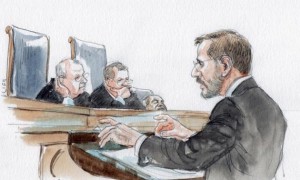Everyone Should Be Grateful For Courtroom Sketch Artists
A courtroom sketch artist can strike a delicate balance between publishing what happens in court and protecting the proceedings from the negative consequences of photographing or video recording.

(Photo via Art Lien)
I do not regularly think about courtroom sketch artists, since they play an ancillary role in the legal arena, and I do not see courtroom sketch artists often in my practice. However, courtroom sketch artists have been discussed recently because a witness in a high-profile case purportedly had issues with how he was depicted in courtroom sketches. Nevertheless, courtroom sketch artists serve a vital role in making court proceedings more accessible to the public, and lawyers should be flattered if a courtroom sketch artist decides to draw a legal professional in the course of their work.
The last time I thought about courtroom sketch artists was several years ago when I was communicating with an old friend who handled criminal law cases. He texted me a courtroom sketch that showed him in a courtroom handling a criminal matter on behalf of a client. To be completely honest, the sketch did not look too much like my buddy, but it did not take a stretch of the imagination to understand that he was the lawyer being depicted — and depicted very well — in the courtroom sketch.

LawPay Pro Offers Upgraded Time And Billing Essentials
Seeing my friend in a positive courtroom sketch made me a tad jealous. I wish I worked in a field, or reached such high esteem in the legal profession, that someone would bother to make a courtroom sketch of me! A courtroom sketch can be seen as a sort of status symbol within certain parts of the legal profession. Courtroom sketches demonstrate that a lawyer has succeeded to some degree and is working on high-profile cases for which courtroom sketch artists want to capture the proceedings visually so that people not in the courtroom can see what happened in court.
Some of my lawyer friends recently seemed to suggest that courtroom sketch artists may become obsolete in the near future. Photographs and videos can more accurately capture what happens in court, and although some courthouses do not allow journalists or others to record the proceedings with cameras, these rules are being liberalized as more and more proceedings are televised or captured by photographs and videos.
However, I think there is good reason to believe that courtroom sketches are here to stay. Perhaps most significantly, some proceedings are simply too sensitive to record with photographs or video or might be negatively impacted if images from the proceedings were widely distributed. Having a courtroom sketch artist draw what happens in the proceedings strikes a delicate balance between publishing what happens in court and protecting the proceedings against negative consequences from photographing or video recording what happens in court.
Moreover, courtroom sketch artists also play a vital gatekeeping role when it comes to covering courtroom proceedings. When the public relies on videos and photographs from court proceedings, the tendency by the producers of these images is to focus on funny moments that do not really have a substantial impact on what is going on. For instance, I recently saw that the media and the public focused on a joke, made by a judge in a high-profile case, which did not have significant bearing on the proceeding itself. Of course, lawyers know that judges like to joke around on the bench (since they have a captive audience with everyone in the courtroom) and that such activity is not at all significant to the proceeding.
Sponsored

The Smartfirm Playbook - Thriving In Today’s Legal Landscape

InterAction+ Brings Power Of CRM Software To Law Firms Of All Sizes

LawPay Pro Offers Upgraded Time And Billing Essentials

InterAction+ Brings Power Of CRM Software To Law Firms Of All Sizes
However, a moment like this can get far too much airtime if everything in a courtroom is captured on video or photographed. Courtroom sketch artists typically do not focus on these trivial moments at a trial and focus instead on the important matters involved in a proceeding. This can make it easier for the public to digest the significant issues of a trial in a way that might not be possible if a flood of information was readily available to the public.
In any event, courtroom sketch artists still have value since they make court proceedings a little more transparent to members of the public who cannot attend a trial themselves. Lawyers should be honored if they are the subject of courtroom sketch artists, even if they disagree with how they are depicted in the sketches.
 Jordan Rothman is a partner of The Rothman Law Firm, a full-service New York and New Jersey law firm. He is also the founder of Student Debt Diaries, a website discussing how he paid off his student loans. You can reach Jordan through email at jordan@rothman.law.
Jordan Rothman is a partner of The Rothman Law Firm, a full-service New York and New Jersey law firm. He is also the founder of Student Debt Diaries, a website discussing how he paid off his student loans. You can reach Jordan through email at jordan@rothman.law.
Sponsored

How Generative AI Is Disrupting Law Firm Billing Practices








